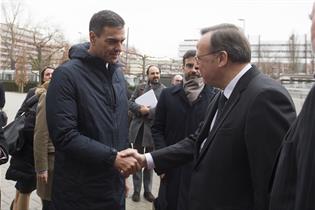The President of the Government meets with representatives from the Council of Europe
While in Strasbourg, Pedro Sánchez underlines strength of Rule of Law in Spain
President's News - 2019.2.7
Meeting between the President of the Government and the Spanish staff in the Council of Europe | Pool Moncloa / Diego del Monte - 2019.2.7
Strasbourg (France)
The purpose of this visit is to reiterate Spain's commitment to the defence of human rights and the values and principles of this organisation, which is celebrating its 70th anniversary.
Pedro Sánchez met with representatives from the various institutions that make up the Council of Europe: the Secretary-General, Thorbjørn Jagland; the President of the Parliamentary Assembly, Liliane Maury Pasquier; the President of the Congress of Local and Regional Authorities, Anders Knape; and, finally, the President of the European Court of Human Rights, Guido Raimondi. Pedro Sánchez told all of them that the Government of Spain has made human rights a priority since the outset by reinstating universal healthcare, defending gender equality, reactivating the Long-Term Care Act and moving forward with so-called fourth-generation rights in line with the UN 2030 Agenda.
Pedro Sánchez also recalled how Spain quickly joined the Council of Europe and became a Member State in 1977 as "a way to validate our democratic credentials and try to protect ourselves against any attempts to turn inwards". Hence, on the 70th anniversary of the organisation, Pedro Sánchez committed to developing a programme of conferences that will evoke the essence of the Council of Europe and issue an extraordinary commemorative stamp.
 Pool Moncloa/Borja Puig de la BellacasaAt his meeting with the President of the European Court of Human Rights, Guido Raimondi, Pedro Sánchez stressed that Spain is equipped with a constitutional system directly tied to the European Convention on Human Rights in terms of fundamental rights and public liberties, as well as an internal system of appeal for legal protection of human rights at the Constitutional Court. This explains why Spain has one of the lowest conviction rates per inhabitant and is also one of the countries with the fastest sentence execution rates.
Pool Moncloa/Borja Puig de la BellacasaAt his meeting with the President of the European Court of Human Rights, Guido Raimondi, Pedro Sánchez stressed that Spain is equipped with a constitutional system directly tied to the European Convention on Human Rights in terms of fundamental rights and public liberties, as well as an internal system of appeal for legal protection of human rights at the Constitutional Court. This explains why Spain has one of the lowest conviction rates per inhabitant and is also one of the countries with the fastest sentence execution rates.
In his speech to the Committee of Ministers of the Council of Europe, which represents 47 countries, Pedro Sánchez underlined the strength of Spanish democracy and said that the essence of modern Spain is to be a society based on the rule of law in which individual rights, public liberties and minority rights are guaranteed and protected. Furthermore, Pedro Sánchez defended the role played by the Council of Europe as a guarantor of the fundamental rights and freedoms "of all" through its treaties, tribunals and protocols, and as an instrument for curbing the rise of exclusive populist and nationalist movements in Europe. He also highlighted the importance of combating political corruption and welcomed the initiatives implemented by the Congress of Local and Regional Authorities to this end.
Pedro Sánchez said it is fundamental to achieve full participation of the Russian Federation in the Council of Europe with rights and obligations, once again defended multilateralism while warning that "the failure by multilateral institutions and the trivialisation of democracy in the past were the prelude to great tragedies" and called for application of the Contingency Plan to not lead to a new split between citizens with their fundamental rights protected by the European Court of Human Rights and those without that protection.
Along the same lines, he asked for a solution to be sought at the annual meeting of the Committee of Ministers scheduled for May in Helsinki (Finland) for avoiding a reduction in the powers held by the Council of Europe as a result of that plan being applied, the implementation of which he described as a "backward step".
Non official translation







